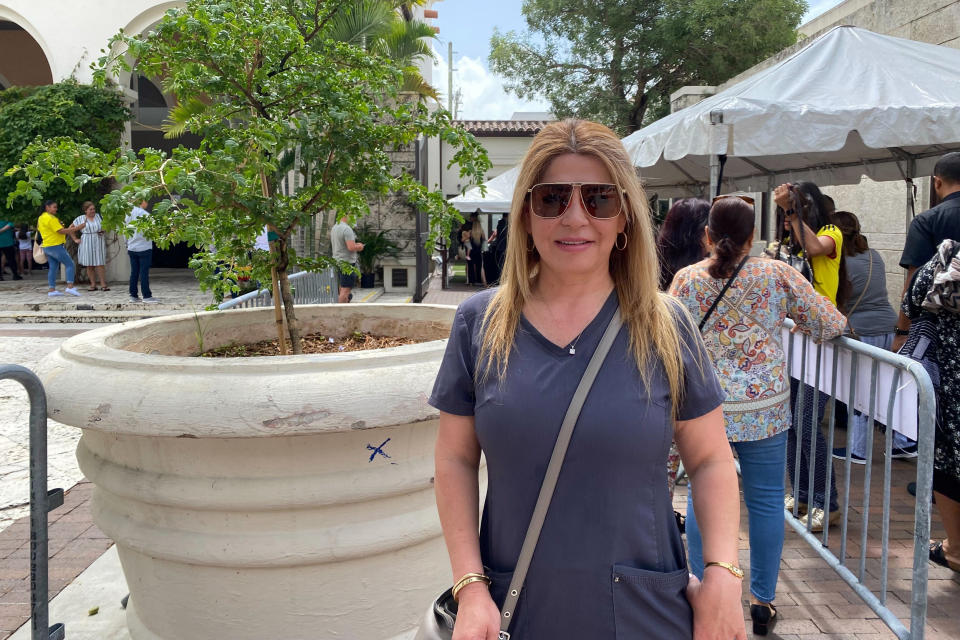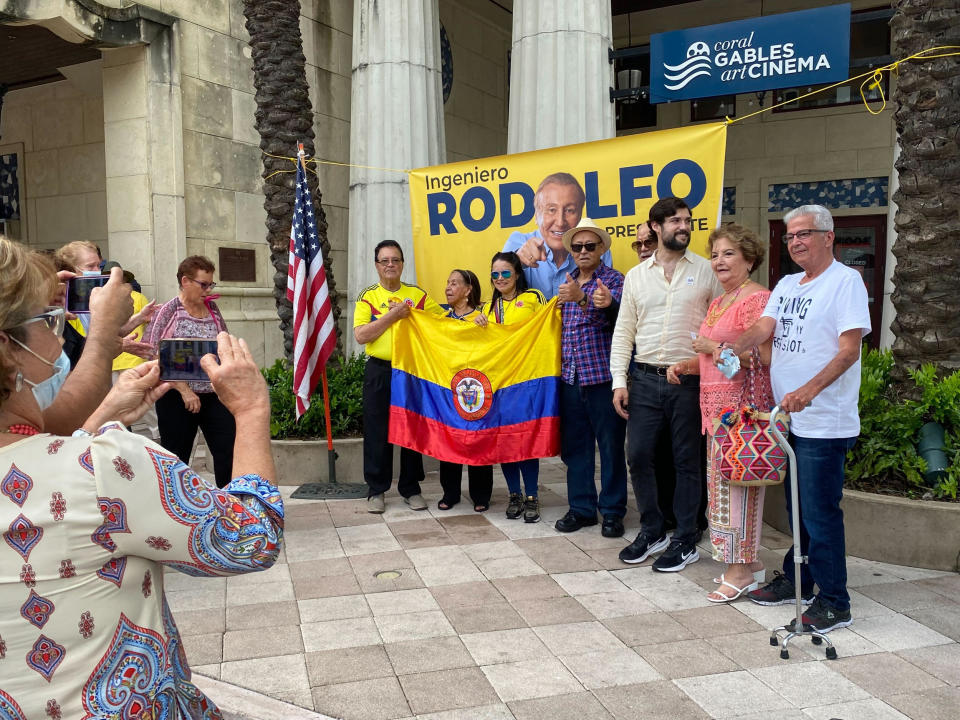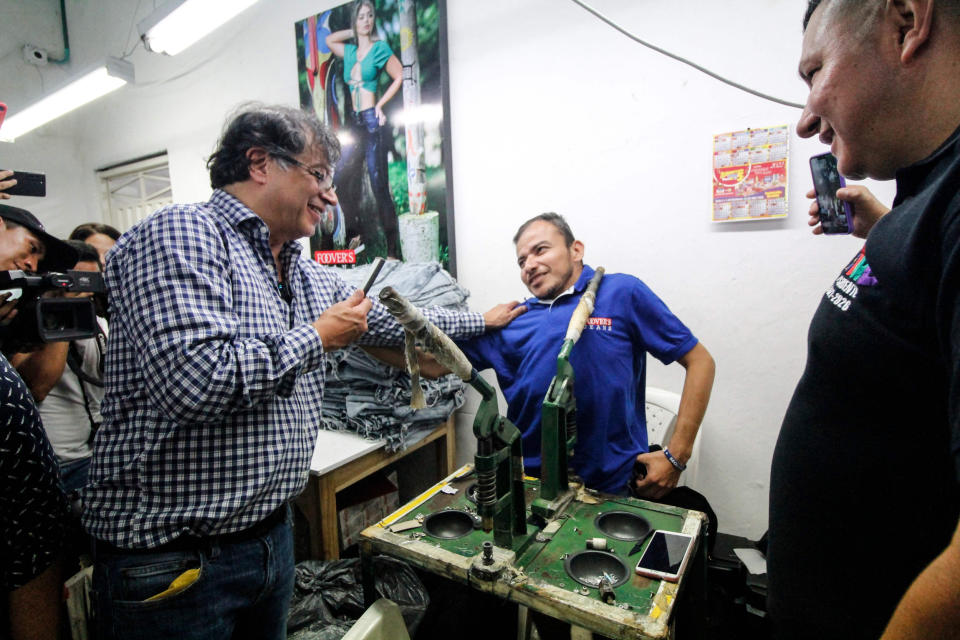Populist or leftist? Colombian Americans vote in high-stakes presidential election
- Oops!Something went wrong.Please try again later.
MIAMI — Colombia is headed for a presidential runoff election Sunday between two nonestablishment candidates, and politicians in Florida, home to the largest population of expats in the U.S., are taking note.
The choice is between Gustavo Petro, a leftist and former guerrilla who has promised profound economic and social change, and Rodolfo Hernández, a millionaire businessman and political outsider that has vowed to drastically cut budgets and fight corruption.
Petro, 62, a longtime senator and former mayor of the capital, Bogotá, is on his third attempt to become president. He was once a rebel with the former M-19 movement and was jailed for his involvement with the group. Petro would be the country’s first left-wing president if he wins. He has tried to reassure voters that he wouldn't take the path of leftist leaders in other countries, stressing he wouldn't take private property or change voting laws to stay in power.
Hernández, 77, who made his fortune in real estate is not affiliated with any major political party, and shocked many when he finished second in the first-round contest. His debut in politics came in 2015 when he became mayor of the north-central city of Bucaramanga. He once punched a councilman who offended him and he is campaigning with a “drain the swamp” message.
He's drawn controversy for a 2016 remark that he was a "follower" of Hitler, though he later said he was referring to Albert Einstein.
Polls show both candidates are practically tied after the first-round election on May 29. They represent a significant deviation from the centrist or right-leaning presidents that have historically governed in the South American country.
“The two candidates represent the frustration Colombians have with the solutions traditional parties have offered,” said Olga Illera, dean of the social sciences department at the University of Jorge Tadeo Lozano in Bogotá. “There is a belief that the political class is only concerned about their own interests."
Colombians are facing rising inequality, as well as grappling with issues around the pandemic fallout, inflation and surging violence.
In Florida, the state with the largest concentration of Colombian Americans, Hernández’s popularity is soaring in the growing conservative voting bloc amid fears of Petro’s leftist ideology. While Petro has spoken out against Venezuela's "crushing of dissent," he's said he would seek closer ties with his neighbor, worrying many Colombians in Florida, a state with a large number of Venezuelan asylum-seekers.
Favoring Hernández, who 'is anti-communist'
Outside the popular voting site in Coral Gables, well-heeled Colombian Americans stood in long lines under the scorching heat to cast their ballots during early voting days. There was excitement and energy among voters, many of them taking pictures, recording videos and streaming live.
Resident Beatriz Marín, 52, took time off from work as a radiology technologist to cast her ballot for Hernández.
“I like his proposals and that he is anti-communist and anti-corruption,” said Marín. “He says the truth up front.”

Colombian expats around the world can vote in Colombia’s election as long as they register. Over 128,000 Colombian expats in the U.S. voted in the primary election, and over 50,000 of the ballots were cast in Coral Gables.
“The turnout for the primary election was historic,” said Colombia's consul general in Miami, Pedro Agustin Valencia Laserna, about the March vote. “During the primary there was a larger turnout than ever before in South Florida.”
Those in Florida tend to support right-leaning candidates. The state had an influx of middle- and middle-upper-class Colombians in the early 2000s, as violence and kidnappings raged in their country. Many of them credit former right-wing President Alvaro Uribe and his government’s offensive against the Marxist Revolutionary Armed Forces of Colombia (FARC) for returning to Colombia to some level of normalcy.
Hernández recently campaigned in Miami. He has received endorsements from establishment politicians, including the conservative former candidate Federico Gutiérrez, who won a majority of support from Colombian Americans during the first round.
Like many Colombians in the U.S., Marín said she was not familiar with Hernández until he and Petro beat four other candidates in the May 29 first-round election.

Hernández’s social media team has turned him into a TikTok star, helping his rise in popularity.
He joined the social media platform on Feb. 28, 2021 and has since accumulated over 600,000 followers. He has gained approximately a thousand followers a day and more than 4.7M likes in total.
The videos include memes trolling his opponents, dancing to reggaeton music, exercising and playing with filters. The self proclaimed “oldie with swagger” has been running a self-funded presidential campaign driven by social media, stressing principles of “no stealing, no lying, no betraying.”
Viral videos have included the day he registered as a presidential candidate last July, with Sweetie singing “That’s My Type” in the background, getting 1.1 million views and two more videos of him explaining that he curses a lot because he’s sincere and doesn’t lie to anyone tallying 4.1 million views.
Favoring Petro, fearing what right wing 'has done'
Though there are far less Petro supporters in Florida, José Raad, 33, an airport worker who emigrated from Colombia in 2016, said he voted for him because “Colombia needs change.”
“I lived through Uribismo in Colombia and I know what it has done,” said Raad, referring to the former right-wing president and those who followed his ideology.

Colombian Americans make up a voter bloc with increasing influence in U.S. elections. Parties have focused on direct outreach to them, especially as Colombia’s elections and the U.S. midterm elections have grown closer.
Many elected officials in Florida have met with the Colombian community and have made sharply worded statements against Petro.
Gov. Ron DeSantis addressed Colombians at the popular restaurant Mondongos. Sen. Rick Scott held a roundtable with Colombian Americans. And Rep. Maria Elvira Salazar, perhaps the most outspoken against Petro, tweeted a video Thursday with the title, “Petro is a threat to the continent.” All three are Republican.
Democratic state Sen. Annette Taddeo, who is Colombian American and is challenging Salazar for Congress, also expressed support for a right-leaning candidate (Gutierrez) against Petro during the first round of elections in May and visited early voting sites to urge Colombian Americans to vote.
Reaching out to Colombian Americans about the elections in their home country is a way of mobilizing voters ahead of the midterm elections. In 2020, about 275,000 Colombian eligible voters lived in Florida, up from about 200,000 in 2015, according to a Pew Research Center analysis of American Community Survey data. While Colombian Americans traditionally voted Democratic, over half of them voted for President Donald Trump in 2020, exit polls suggest.
In New York, with the second-largest Colombian population in the U.S., Hernández is also popular.
Héctor Antonio Sánchez Ríos, 74, from Jackson Heights, Queens, said that during the first round of voting in May he spent four hours praying in front of his television so that Petro wouldn’t win and go to a runoff. But “that’s what God wanted,” he said.
He's now voting for Hernández, brushing off negative rumors about him, saying, “I prefer an engineer than a guerrillero," the Spanish word for guerilla.
When asked about Hernández’s social media-driven campaign, Ríos said he was smart. “Social media is democracy.”
Carmen Sesin reported from Miami, and Christopher Alvarez from New York City.
Follow NBC Latino on Facebook, Twitter and Instagram.

